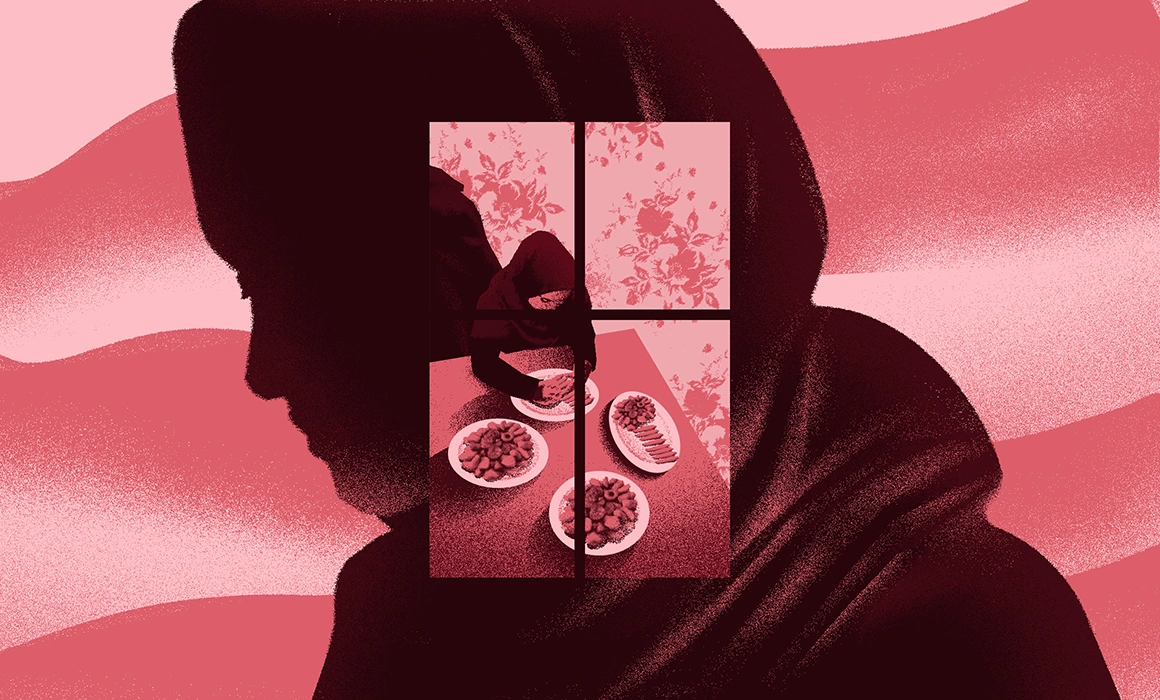Saeeda*, a 31-year-old engineer, is one of the thousands of Afghan women who became prisoners in their own houses after the Taliban banned them from working. And one of the over 250,000 Afghan citizens who worked with American organizations during the 20 years of war in Afghanistan and were not evacuated when the Taliban came to power.
I tried to help her get out of her country and I failed. However, I did manage to get her story across the border.
UPDATE December4, 2021:
After the publication of this article, the Romanian Ministry of Foreign Affairs responded to Saeeda's request for political asylum in Romania: “The request is under analysis according to the legislation in force and a decision will be taken by the interministerial Committee of the National Coalition for the Integration of Refugees.” The Ministry of Foreign Affairs also mentioned that it does not currently foresee the implementation of new procedures for evacuating and transporting Afghan citizens to Romania, but that it will continue to support projects that directly contribute to improving their situation.
On July 23, I received a message on Facebook, in English, from someone who wasn’t in my friend list. I was in Phoenix, Arizona, with a Hubert H. Humphrey scholarship. I had just woken up in a room overlooking a courtyard with orange, banana, and fig trees. I felt like I was in paradise. It was my last week working for New America, a Washington, D.C.-based think tank, where I was doing remote research and I had one month left out of nine in total spent in the States.
“Hello Ms. Marinescu, hope my message finds you well. I am Saeeda from Afghanistan. I am a bachelor of civil engineering and graduated in 2015. Currently I am the Prof Assistant at the X University (n.r we don’t mention the name for protecting her identity) and I also have the responsibility of the research department of Y Institute. I would like to apply for the H. Humphrey fellowship program from Afghanistan. My field of interest is natural resources and climate change. I read about you and your success on the internet and I know that you are one of the winners of this fellowship. I have provided my application. If it is possible I would like you to review my application before submitting. Thank you. I am waiting for your message.”
Saeeda was writing to me a few days after another Pakistani engineer had contacted me with the same request. They both found me on the official Facebook page of the Hubert H. Humphrey program, which had shared a post about a prize I won in the Romanian Superscrieri journalism competition. Saeeda had written to several fellows to help her. “I looked at the pictures and chose the ones that I thought were good people. You were the first to respond.”
When I read her application, I was impressed by her experience – she had worked for six years on several climate change projects (many of them funded by American organizations)– and her courage and determination. For one of the questions she had to write about a challenge she had encountered in her career and the way she overcame it. She wrote about a project that involved going in the field and interviewing locals from nearly 100 villages, so that she could build an efficient irrigation system in the area. However, half of the villages were under Taliban rule and it would have been too dangerous to go there as a woman. Because she needed answers from all these places in a very short time, she managed to persuade one farmers’ leader from each Taliban-led village to go to a nearby town and participate in the research there.
- Your application is fantastic and I hope from my heart you will get the fellowship !, I wished her, after suggesting a few rewordings.
- Delia, thank you so much. I don't know what to say, just wish you a best life forever dear, she replied.
*
Three weeks later, on August 16, after watching hours of videos of Afghan people clinging to planes and dying, in an attempt to leave the country after the US troops had begun their retreat from Afghanistan, I received a new email from Saeeda.
“I hope you are fine. You must know that the Government of Afghanistan has fallen and the U.S. is closing its embassy in Afghanistan. Closing the U.S. Embassy means the rejection of my application. I have sent my application on time, but since then there is no embassy in Afghanistan and the situation is very dangerous. I would like to contact the main office of Humphrey and request to review my application. It is very important for me and it is very hard for me to be deprived because of the political situation in my country. (...)If you have any contact please share with me. I really need your cooperation.”
*
Since invading Afghanistan in 2001 (at the behest of President George W. Bush), the United States has spent more on “nation-building” in Afghanistan than in any other country, allocating 133 billion for reconstruction programs, aid, and Afghan security forces. That is, more than they spent on the Marshall Plan (“European Recovery Program”) throughout Western Europe after World War II. “Instead of bringing stability and peace, however, the United States has built a corrupt and dysfunctional Afghan government that remains dependent on U.S. military power for survival,” The Washington Post journalists warned in “The Afghanistan Papers” investigation, published in December 2019.
“Some measures have significantly improved life in Afghanistan since 2001. The infant mortality rate has dropped. The number of children enrolled in school has increased. The Afghan economy has grown almost fivefold. But the United States’ nation-building project has bounced back in so many ways that even the foreign aid advocates have questioned whether Afghanistan could have been better off, in fact, without any US aid,” the same investigation noted.
*
I gave Saeeda the contacts of the Hubert H. Humphrey board and asked her where she was now, what the atmosphere was like in her area, and if she could go to work. I posted part of the answer on Facebook, with her consent.
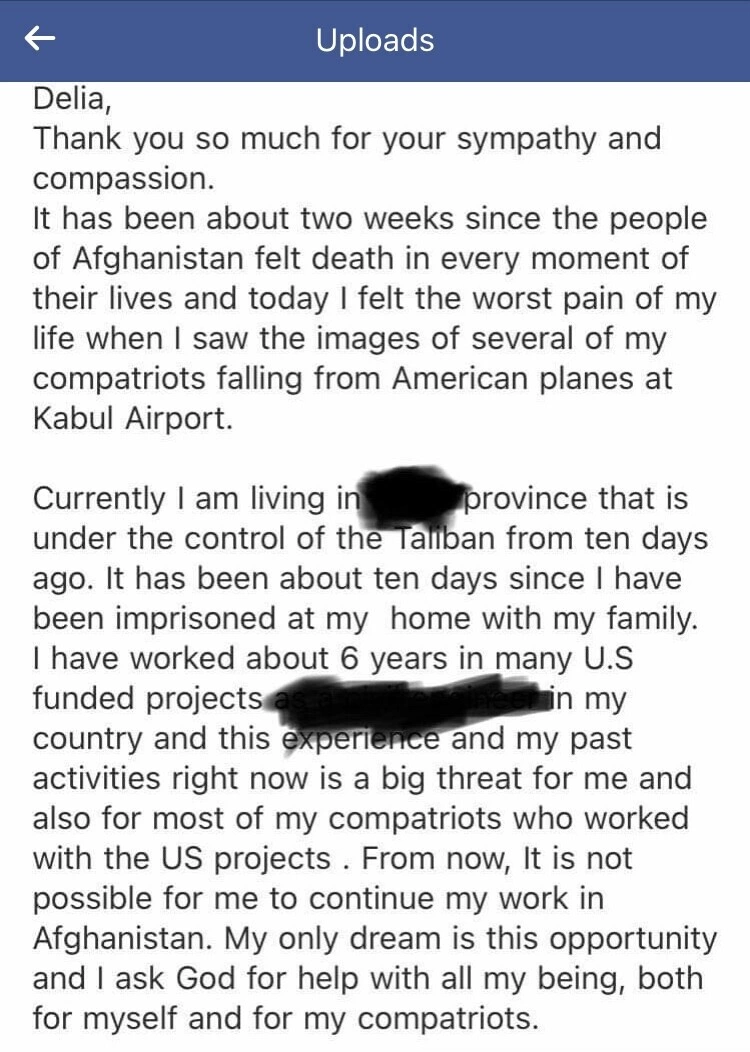
Since she could be targeted by the Taliban because of her cooperation with the Americans, I asked her if she would consider coming to Romania temporarily (someone had written in the comments that she could even send her an invitation letter, if needed). If so, I could put her in touch with an NGO working with refugees.
“I read the comments on your post and I’m very lucky to know you and your friends,” she wrote to me. She was interested in coming to Romania, but there was a small problem, she told me: she lives with her mother and two brothers, she is not married and has no children, and she would come alone. Before applying, she wanted to know two things. How much do a visa for Romania and a plane ticket from Pakistan cost, because it is dangerous to fly from Kabul, the capital of Afghanistan? Then, would it be possible to ask for a visa only for a short period of time? She would like to stay here until the situation in her country becomes clearer.
I told her that the NGO should have these answers and advised her to ask them about the kind of government aid and job opportunities that would be available for her, since I didn’t want her life to come to a standstill, even if she was away from the dangers of Afghanistan.
I started thinking about the responsibility I would feel if she got to Romania and, implicitly, about the guilt, in case the reality she found here wouldn’t match her expectations. I also thought about interviewing her, but it seemed too late to ask her that. The journalist in me had let the human being out first, as in many other cases. We kept talking on Facebook more and more often.
August 19
- Delia, I have heard a good news last night. A group of women who are educated and have worked with U.S and many worked on government organisations, they decided to make a gathering and meet with the head of Taliban in x province. I would participate in this meeting.
- Won't it be dangerous?
- We have to do something, it is our country and for achieving our rights we have to do this. We didn't do any wrong action before, we just serve for our poor people. They must know this. If they let us continue our work, I don't want anything more. Now it is not possible that I have the freedom like before. With the coming of the Taliban, women are completely destroyed in my country.
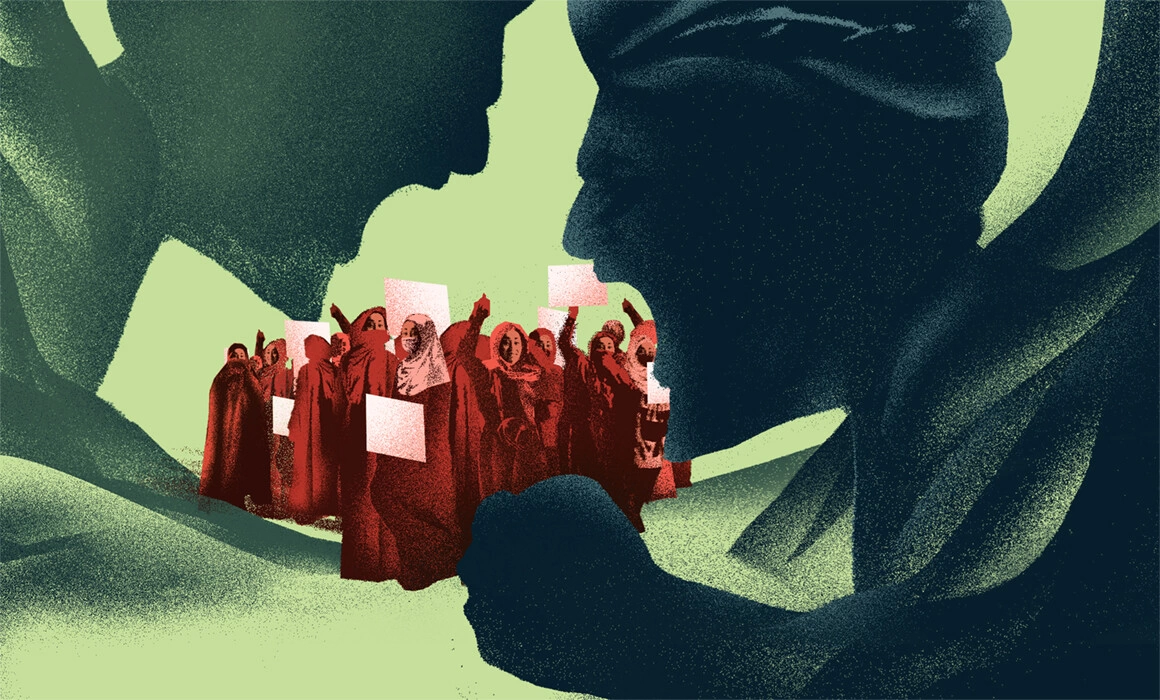
August 20
Saeeda wrote to me that she heard that those who had worked with American organizations could apply for a special visa in the States, but an American citizen has to confirm that they had worked together. The only one she had directly communicated with was the manager of a company developing infrastructure projects in Asia and Africa, but he hadn’t responded to any of the many emails and messages she had sent him via Whatsapp. I told her to give me his phone number, so I would call him.
- Saeeda, I talked now by phone with him, he wasn’t very nice, but he was open to talk. He insisted many times that he is not an NGO or media organisation and that he can’t write that letter. I told him that it doesn’t matter, that he just needs to write that you worked with his company, because his letter will help. He admitted you worked together, but he said he will think about the letter.
- Delia, I don’t know how to thank you. Now I wish I can see you one day.
- It’s my duty to help anyone who is in need if I can, Saeeda. I wish you from my heart all the luck to be safe and have a better life!
August 22-23
Saeeda has heard that there was another way she could apply for a visa to the States and she told me that she understood if I wasn’t able to help her with that. Specifically, she could explain her situation in a letter, which I would then forward to a U.S. senator. I told her that I had the contact of an Arizona senator, whom I had met at a seminar, and that I would send her an email on Monday, because by then it was the weekend and nobody was working. She thanked me and told me she would wait, but the time was short and there were only ten days left in which she could apply for the visa.
- Here it's 3 AM and I cannot sleep.
- Saeeda, try to sleep please. It is very important to keep your mind in peace as much as you can. I understand it’s not easy, but I hope you will manage to sleep for a few hours. I am sending my prayers and wish you all the luck!
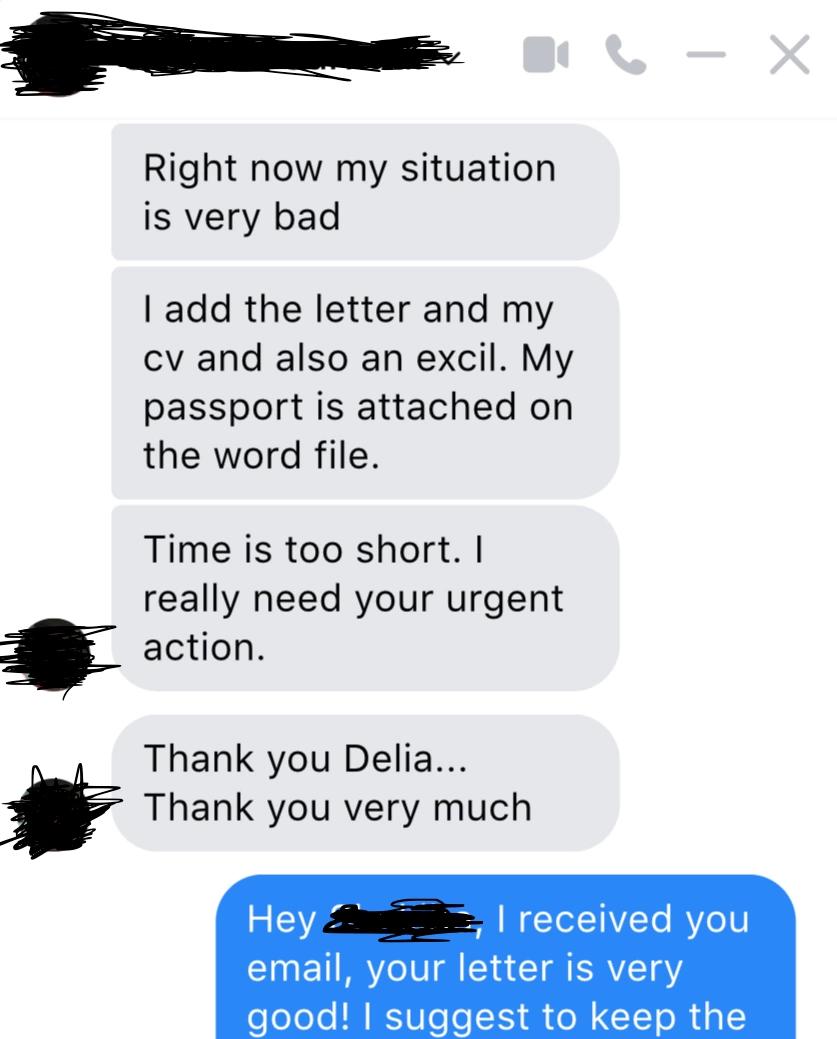
August 24
- Delia, I received this email, I think this is a writing email that was sent to all. I think they did not see my request and my document. I am a little disappointed, but we can not do anything. You helped me a lot, I will never forget.
The e-mail is addressed to all those who were in Afghanistan at the time and wanted to leave the country urgently –both Afghan and American citizens–, noting that the State Department focused on US citizens and those who were already in the process of applying for the Special Immigrant Visa. People were advised not to call the U.S. Embassy in Kabul for information, nor to go directly to Kabul Airport until they were personally notified by email that they might be leaving.
August, 29
- Delia, I have not received any message from the Senator. I am completely disappointed. The Taliban will never let me work as a civil engineer. I became a house prisoner. I have been thinking for several days now what I can do from home.
She wanted to research the impact of the withdrawal of U.S. forces from Afghanistan and publish it in international journals. From the airport in Los Angeles, on my way to Romania, I wrote to her I was glad she had found a way to document the situation she was in and thus move on. I advised her to focus on the women who had also worked with Americans and could not leave the country, and to find five more cases like hers. The series could be called “The women left behind,” I suggested.
September 12
- Last week I have received an email from U.S department of State; they confirm they received my application and regardless of the operation status of the U.S embassy in Afghanistan they would review my application. I also have received an email from Foreign Affairs Department of Romania; they asked me for some documents and my exact address. I have sent them and they told me they would send the response within 30 days. The situation has not changed in Afghanistan but now I feel better. If I receive any confirmation I would come to Romania.
- Hey, Saeeda, great, I am waiting for news from you then and I hope that the governmental help that you will receive here if you come and the opportunities that you will have will be as you expect and deserve!
November 1st
I asked her if she had any news about her visa for Romania or the application to the Hubert H. Humphrey program. She hadn’t heard from the Romanian Foreign Ministry since August 20, when she had been told she would receive an answer within 30 days. The last time she had heard from H.H. it was September 22, when she was told that the selection process was still ongoing. I suggested that we talk at length, because I wanted to write her story and ours.
*
After three months during which we kept in touch only through text messages, we finally saw each other in a video call and we heard each other’s voices. She spoke enthusiastically and burst into tears when she pointed out that this was not just her story, but the story of all the women in Afghanistan. Saeeda is one year older than me and she is as dear to me as a sister. I feel an inexplicable connection to her. Maybe because if my father, who served as a military aviator, had lived, he might have taken part in Romania’s war in Afghanistan, like many of his colleagues. I had always wondered what that would have been like.
Because the Taliban had silenced Saeeda’s voice more than ever, I decided to let her story be told in her own voice.
Saeeda:
In Afghanistan there were enough restrictions on women even before the Taliban came to power again (n.r. they had ruled the country between 1994 and 2001). I’ve struggled for everything in my life, even to study what I love. I was very lucky that my father allowed me to go to school, but I endured a lot of suffering, because I wanted to be an engineer. From an early age, I asked him to allow me to work in this field, but he was categorical: It’s not for women, the Taliban will kill you. He was a doctor and his dream was for me to have the same profession.
I chose to go to the engineering college without his permission, and as a result, he didn’t talk to me for four months. Finally, something happened. Our house was in a rural area, where most of the locals lived from farming. The water level in that area had dropped in recent years, and people didn’t know how to cultivate in the new conditions. I asked one of my teachers to come to the area with some experts and teach people how to work the land despite the drought. In a short time, the situation of the locals improved and they had a rich harvest. After this episode, my father reconciled with me and supported me to continue on the path I had chosen. But he was always worried that something bad might happen to me.
The Taliban have always had problems with engineers because they were making progress. They have captured several engineers in the past years. My colleagues have been beaten and threatened by the Taliban several times, and one day eight of them died. They were on the field in a village checking out a school building project, when the Taliban blew up their car.
At one point, we were working on a project where we had to go to various Taliban-led villages and inform farmers about climate change. It would have been dangerous for us to go as engineers, so we pretended to be doctors. The Taliban had no problem with doctors, allowing them to travel anywhere. We took a doctor with us and first discussed health issues, and then we explained to the villagers how to cultivate the land. It was an extremely hard and dangerous job.
Another time, I was working on a project to bring electricity to people’s houses. Twice a week, I would go to a village with a few colleagues, accompanied by a bodyguard. On one of these trips, my father accompanied me, as he was afraid that I would fall into the hands of the Taliban. On the way to the car, the Taliban attacked our car, beat my father, and took two of my colleagues with them. They told me that they didn’t want electricity, because when there is electricity, people will have television and internet and they will end up in the devil’s hands.
Before the Taliban came, I did some research on glaciers. Last year, glaciers in Afghanistan melted, causing a major flood and the death of about 200 people who were swallowed by water. I suffer a lot when I see something like this happening in my country. During the research, we found out that in the same area there are more glaciers that will melt in the near future and will produce even bigger floods, in which many people can be killed. There are a lot of things we could do to try to stop this phenomenon, but now we’re not allowed to.
I’ve been home for two months and I can’t do any of this. We have repeatedly asked the Taliban to allow us to return to work, but they have said that it is better for women to stay at home. I called my male friends, who can still work, and asked them to secretly send me some tasks to do from home. But they told me that in every department there is a Taliban who checks everything and it is not possible for him to give me anything to do.
Now I do the housework. I cook, wash dishes and sometimes read. I read over ten motivational books by Wayne W. Dyer, including “The Power of Intention” and “Being in Balance”, a book on the history of Afghanistan and “One Hundred Years of Solitude” by Gabriel García Márquez. I felt even more pain when I read this book. He writes that the end of life means isolation and loneliness. This book is exactly the story of my current life.
Our house is very small and I don’t even have a place to walk. I walk around my room half an hour a day. I try to think less about the situation because, when I think about it, I get very sad. Sometimes, when I feel really bad, I sit in a corner of the room and write. That makes me feel very good. I write about the future I want and I hope to fulfil my dreams. I try to write a good future all the time, a future in which I am free and there are no Taliban. I tell God every day that I am ready to die, only to be saved from this situation in which I find myself. I feel like screaming in the streets and asking the Taliban what I have done wrong to be held captive. To shout that this is not the life I want.
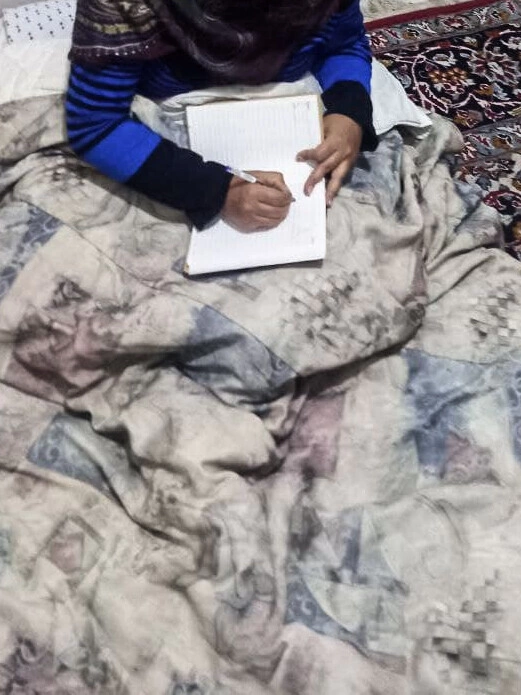
I live with my mother and two younger brothers. One of my brothers is married and has a two-year-old boy, which is one of our greatest joys these days.
My father died last year of Covid-19. That night, there was no oxygen in the hospital where he was, and I went with my brother to search the whole city, but we couldn’t find it. I went back to the hospital and my father was very ill. I touched his feet and saw that they were cold. Every time I miss him, I look at my hands and I can still feel his feet in my hands. Before he died, my father told me that he loved me very much and that he was proud of me. He also told me to never be sad and dream to the stars.
I can honestly say that my father was the best man I knew. My father believed that humans were created for two reasons: to know God and to serve others. My father worked as a doctor in an isolated village for 40 years and treated hundreds of thousands of people. He also insisted on building a school in the village where we were born and taught people to send their daughters and sons to school. People loved my father because he worked for them honestly.
*
For a few weeks now, every morning, from 7 to 10, I’ve been making sweets with my mother and sister-in-law, and my brother sells them in town. They are called hojun. The ingredients are: flour, eggs, milk and sugar. My mother and sister-in-law knead the dough and shape the sweets, and I fry them in oil, then I pass them through a syrup made of water and sugar, while they are still hot.
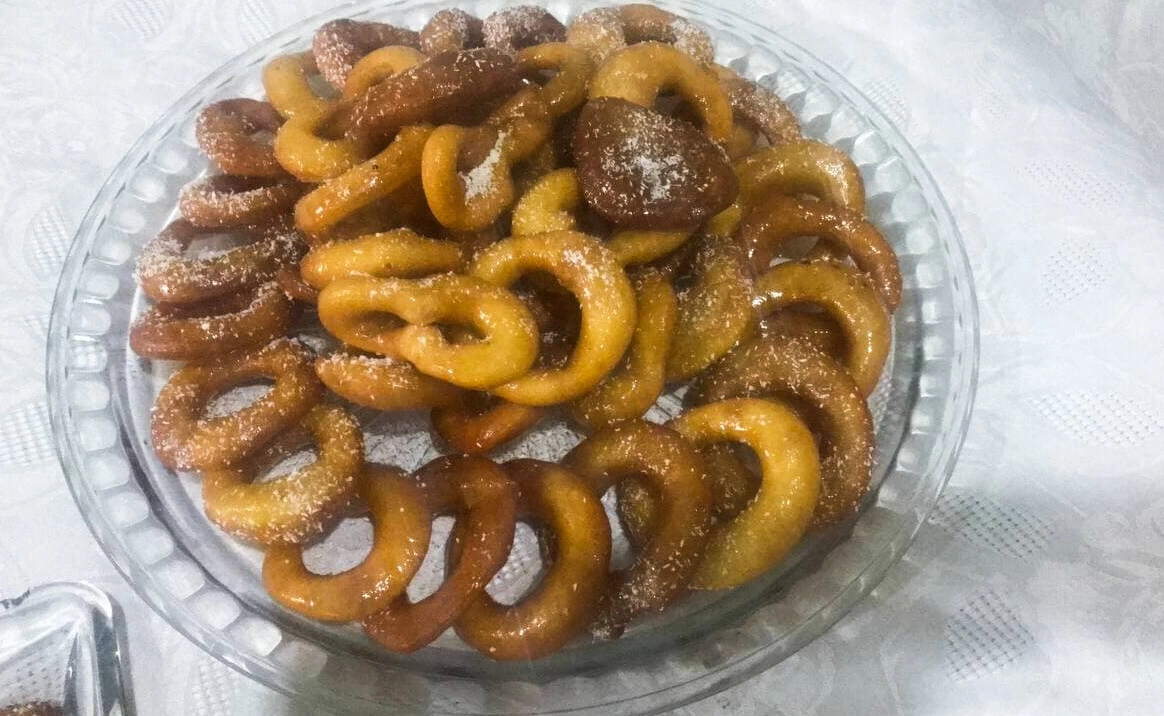
*
We also make carrot and apple jam. While cooking, my sister-in-law and I talk about the situation we were in. We wonder how we got here and how long it would take. She is 24 years old, she is a college graduate as well, and used to work for an international organization. Sometimes we talk about my dream of studying in America, and my mother, when she hears me, tells me that this dream is too big and that I should see the reality I am in.
My brother sells 4-5 pounds of cakes and the jars of jam to a supermarket that pays us the equivalent of $4 a day. He invests half of his money in other ingredients for sweets and from the rest he buys vegetables – eggplants, tomatoes, potatoes, onions, carrots, cabbage, pumpkin. Many of the dishes we cook are pumpkin-based, which is very cheap. The last time I ate meat was ten days ago, when an uncle came to visit and we cooked for him. Meat is very expensive and we only buy it when we have guests, in Afghanistan people are very hospitable.
Because the situation was unpredictable for us, we were not prepared at all and, unfortunately, we did not have much savings. My little brother has diabetes and we have to buy him medicine every month, and the cost is high. It has been difficult for us to get the pills in the last two months and I don't know how we will do in the future. Many companies were closed after the arrival of the Taliban, and unfortunately the job opportunities are reduced even for men. The other brother graduated from engineering school this year and was considering going to work in Iran or Pakistan, but the cost of a visa and transportation was too high.
In the house we don’t always have electricity and we heat ourselves by a traditional method, it is called sandali. We put charcoal in a tin dish, then a wooden stand around it, and a blanket over it.
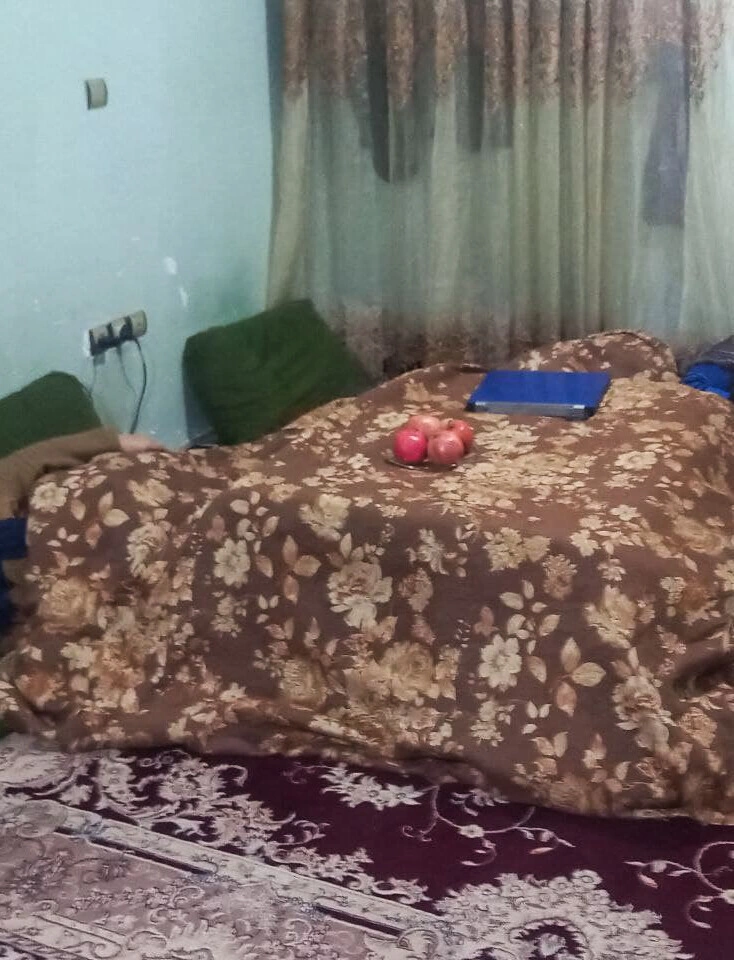
*
When the Taliban were in power in Afghanistan between 1994 and 2001, I was small and I don’t remember much. But a moment stayed in my memory. I was shopping with my mother and two Taliban entered the supermarket and beat my mother because she was not allowed to leave the house at all. When I got home, my mother cried a lot.
A year ago, my father was telling me almost every day that the Taliban would come to power again. He believed this because more and more villages had begun to be controlled by the Taliban. And he always told me to get ready for their return. I never believed.
Today, if there is an emergency and I need to get out of the house, a man has to come with me and I have to wear clothes that cover my whole body and face. Do you believe me that I’m crying under them?
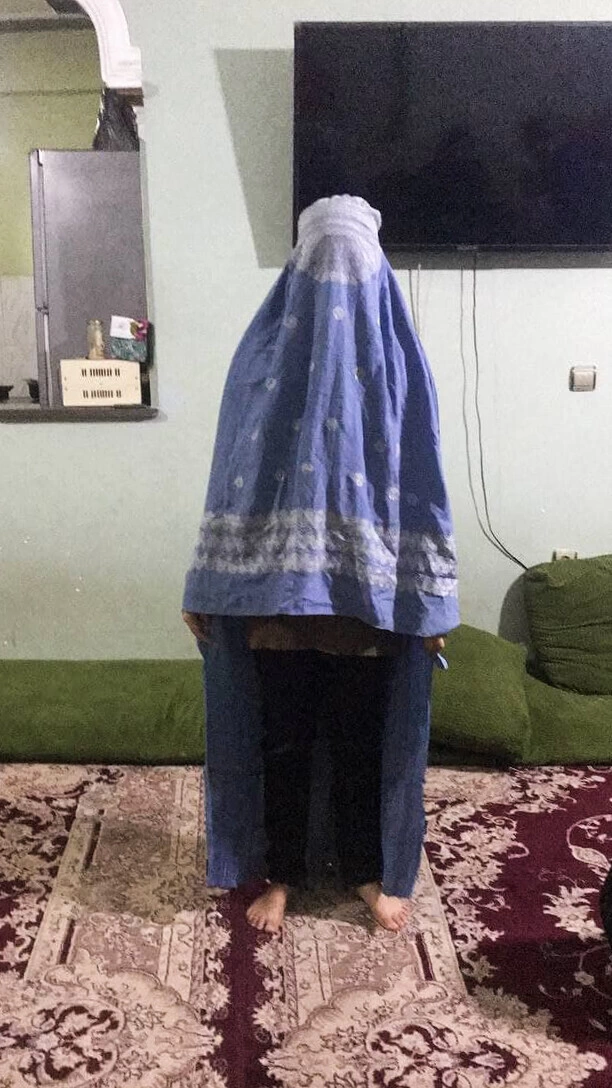
*
A few weeks ago I went to a meeting organized by a woman who owns an NGO for women’s rights. We wanted to tell the Taliban about our problems. That we want freedom, to go to school, to university, to work, to leave the house alone, without being accompanied by a man. A message with the time and location was distributed two or three days before the meeting. It was very dangerous, I was accompanied by my cousins. When I left home, I hugged my mother and she started to cry. I told her I would come back.
The meeting was attended by several hundred people, women, men, young girls, pupils, students. But unfortunately we couldn’t talk to the Taliban, because after about 20 minutes they came and started to shoot at the crowd. When I heard the shooting, I was completely shocked. We started running and they were following us. Do you believe me that I didn’t have enough strength to run? Several people died, including children.
*
I struggled for many years to get to where I am today. In the past, when I was thinking about my goals, I was seeing very few obstacles in my way. I dreamed of studying in America. Now it has become a dream to go for a coffee with my friends or to walk around the city, in the park where I used to exercise every morning. I would like to go back to the university, to my students and colleagues and hold a conference. I would love to go to the most remote villages in my country and tell my people how to grow according to climate change. These are my biggest dreams these days. Every moment I wait for a miracle.
There are a lot of people like me, women and men who have worked with Americans and other foreigners for 20 years and who didn’t manage to get out of the country.
We always think that the Taliban could attack and kill us, because in their eyes we are bad people who cooperated with the Americans. Three of my acquaintances worked directly with American special forces and are now hiding in their homes. Many people have moved to other houses because of this. This is not just my case. We have sincerely supported the Americans in Afghanistan. I think they should support us as well in any way they can.
I promised myself that if life gave me another chance, I would appreciate every moment and make the most of every minute of my life.
*
• It has been 3 months since Saeeda sent her application for political asylum in Romania and since she was notified by email that she would receive a reply within 30 days.
• The Press Office of the Ministry of Foreign Affairs of Romania told Scena9 that it could not provide information on Saeeda’s case, for reasons related to the protection of personal data. An exception would be made if she wrote to them that she agreed I should receive the information, which Saeeda did later. To press date, I had not received any updates from the Ministry.
•The coordinators of the Hubert H. Humphrey program told Scena9 that the selection process is still ongoing.
• The Arizona senator’s office did not answer yet the question regarding the status of Saeeda’s asylum application.
• After the withdrawal of American troops from Afghanistan, 156 Afghan citizens who were in danger arrived in Romania (collaborators of Romanian troops in Afghanistan, students with scholarships in Romania, activists, teachers, magistrates, etc.). About 140 Afghans have arrived in Arizona, and authorities plan to receive up to 1610 people in the next six months.
* Saeeda means “happy / lucky” in Dari language and is a pseudonym to protect her identity.
** Our conversations have been shortened and edited for coherence.
